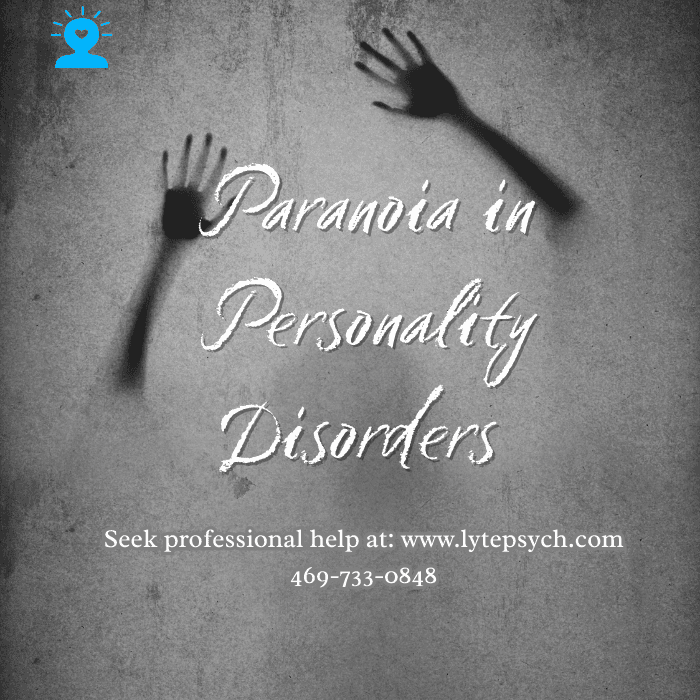Thu Jul 17 2025
Paranoia in Personality Disorders at Lyte Psychiatry, Best Adults and Adolescents Therapist and Psychiatrist Near You (Affordable Therapist and Psychiatrist Near You) Dallas & Arlington, TX.

Paranoia in Personality Disorders
Compassionate Care at Lyte Psychiatry – Best Adult & Adolescent Therapists and Psychiatrists Near You (Affordable Mental Health Services in Dallas & Arlington, TX)
At Lyte Psychiatry, we help adults and adolescents in Dallas and Arlington, TX better understand the connection between paranoia and personality disorders, offering accurate diagnoses, supportive therapy, and affordable psychiatric care.
What Is Paranoia?
Paranoia involves unfounded or exaggerated suspicion of others. It can show up as:
✅ Distrust in relationships or friendships
✅ Fear of being deceived, attacked, or harmed
✅ Believing others are talking about you behind your back
✅ Constantly reading hidden meaning into everyday interactions
✅ Avoiding people due to perceived threats or betrayals
Paranoia and Personality Disorders: What’s the Connection?
Paranoia can be a symptom in several personality disorders — conditions that affect how a person thinks, feels, and relates to others.
Personality Disorders Commonly Linked to Paranoia:
1. Paranoid Personality Disorder (PPD)
✔️ A chronic and pervasive mistrust of others
✔️ Belief that others are lying, cheating, or trying to manipulate
✔️Difficulty confiding in people, even close friends
Tendency to hold grudges or react with anger to perceived slights. PPD often results in social isolation, emotional distress, and impaired relationships.
2. Schizotypal Personality Disorder (STPD)
✅ Odd beliefs, magical thinking, or eccentric behavior
✅ Suspiciousness or paranoid thinking
✅ Discomfort with close relationships
3. Borderline Personality Disorder (BPD)
✅ Fear of abandonment and intense emotional reactions
✅ Moments of paranoia or dissociation, especially under stress
How Does Paranoia Affect Daily Life?
When left untreated, paranoia can deeply impact:
Relationships – leading to arguments, isolation, or breakups
Work and school performance – due to fear of sabotage, criticism, or betrayal
Mental health – increasing the risk of depression, anxiety, and substance use
Quality of life – creating a persistent sense of fear, threat, and emotional exhaustion
It’s important to know that paranoia isn’t always a sign of psychosis — in the context of personality disorders, it’s often part of a complex pattern of thinking shaped by early experiences, trauma, or brain-based factors.
How Lyte Psychiatry Can Help
Our goal is to help individuals understand why they feel the way they do, reduce fear-driven thinking, and build healthier, more secure relationships.
To schedule an appointment. Click Here
To see our services. Click Here
Call us if you have questions at 469-733-0848
🙋 Frequently Asked Questions (FAQ)
Q: Is paranoia always a sign of psychosis?
A: No. Paranoia can occur in personality disorders and anxiety disorders without psychosis. A professional evaluation can help clarify the cause.
Q: Can therapy reduce paranoid thinking?
A: Yes. Therapy can help challenge distorted thoughts, manage triggers, and build healthier ways of thinking and relating to others.
Q: Will I need medication?
A: Not always. Some people benefit from therapy alone, while others may need medication for related symptoms like anxiety, depression, or emotional reactivity.
Q: Can teens show signs of paranoid thinking?
A: Yes. Adolescents can experience paranoia, especially if they’ve been through trauma, bullying, or emotional instability. Early intervention is key.
Q: Is Lyte Psychiatry affordable?
A: Yes. We offer insurance-friendly care and affordable self-pay options for individuals and families.